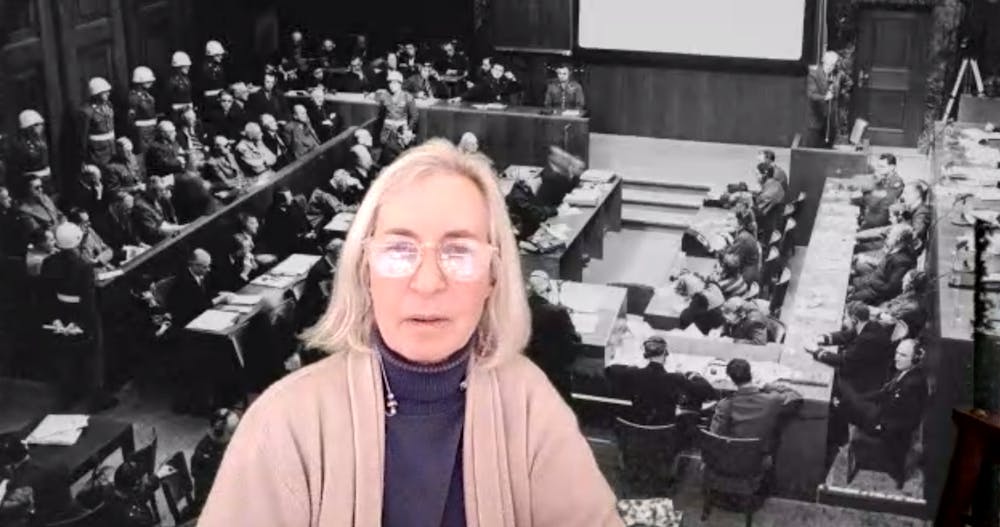Martha Minow, distinguished legal scholar and former dean of Harvard Law School, presented the annual Grob Lecture on American Jewish Life Tuesday night, discussing her new book “When Should Law Forgive?” and themes of Jewish and American history. The lecture took the form of a webinar conversation with James Loeffler — the Jay Berkowitz professor of Jewish History and the Ida and Nathan Kolodiz director of the Jewish Studies Program.
The conversation began with a discussion of Minow’s new book, which explores the intersectionality of law and forgiveness. In her book, Minow juxtaposes various concepts — something she described as a way of helping to “tease out our intuitions.”
One comparison she drew surrounded the difference in treatment of child soldiers and juvenile offenders. While child soldiers who engage in violent acts are often not held responsible because of claims of manipulation and coercion by adults, the same reasoning is not applied to juvenile crime offenders, who are also often engaged in crimes not of their own creation.
“I think that the causes of war are so well understood as complex and beyond the actions of any individuals, whereas that's not always true when we talk about street crime or drug crime,” Minow said. “But I think that understanding the systemic and institutionalized dimensions of the latter are as important as the former.”
Minow also spoke under a similar lens about debt and crime, where she explored the interconnections between debt and incarceration and emphasized the importance of looking at the broader picture within which an incident occurs. In the legal system, and even in ordinary conversations, there are “concentric circles” whose combined background lead to a certain result, but often individuals do not look at these broader connections.
The conversation then shifted to discussion of the Nuremberg trials — a series of trials held after World War II in which former Nazi leaders were tried for war crimes. This year is the 75th anniversary of the trials. Minow explained the initial controversy surrounding the trials due to its application of retroactive justice, but also its importance in inspiring civil litigation and setting a precedent for using the legal system to address mass violence. The documented evidence from the trials prevents denial of crimes and serves as a means to learn from the past.
Loeffler further asked Minow to explore the idea of seeking reparations. Minow remarked upon recent developments across the country regarding reparations. On March 22, Evanston, Ill. became the first city in the U.S. to commit to paying reparations to Black residents who faced housing discrimination. Governor Ralph Northam also recently signed a bill requiring public universities in Virginia to pay reparations to descendants of enslaved laborers.
“One of the encouraging signs about these developments is the creativity of inventing new institutions, new forms of accountability, new forms of reckoning,” Minow said. “I think reckoning is probably more the right word for the United States at this time than forgiveness. It's coming to grips with the past ... It doesn’t mean how do you forgive or who forgives or who lets go or who forgets, it's come to grips with it and integrate it with who we are.”
Loeffler added that the University’s Memorial to Enslaved Laborers — which will be dedicated Saturday — is also a way of dealing with space and memory. Minow agreed, saying that monuments such as these create physical and mental spaces for individuals to reckon with both their own and other people’s pasts.
Minow continued on to discuss a need for American law to evolve beyond individuals — something that contrasts with Jewish law, where the primary frame is obligation. Despite everyone being an individual entity, she emphasized that everyone is also connected and part of a larger community.
Shifting to a question about American exceptionalism, Minow acknowledged that, as the wealthiest country in the world and the country with the largest military capacity, the United States is subject to resentment, which is a reason behind the United States’ refusal to join the International Criminal Court — a court separate from national courts that investigates and tries individuals for crimes against the international community. However, she argues that there are also inconsistencies regarding the country’s own commitment to human rights, particularly with the era of Jim Crow segregation.
“There are concerns I think that really are undermining some of our own commitments by claims of exceptionalism,” Minow said. “We say in the United States that we’re committed to a set of human rights values, but if we don't pull those same standards to ourselves, we don't actually have the moral authority, globally.”
In a period of time where most of the nation holds polarizing views regarding a multitude of various political issues, Minow emphasized the importance of facing the past — particularly the facts — and learning to use reason untainted by bias instead of politicizing everything.
“If we can't actually agree upon what happened, I don't think there's any chance of building a solid shared future,” Minow said. “That for me is absolutely, undeniably, a first critical step that has not fully been embraced.”
Minow concluded with a call to action to use law as a framework for dealing with reckoning of the past.
“Law itself is a project, the idea that we can be abstracted from our immediate circumstances, that we can use words to resolve our conflicts,” Minow said. “This is a hopeful project and the grounds for that hope are in jeopardy. We have to work hard on rebuilding those grounds for law to play an important role going forward.”







